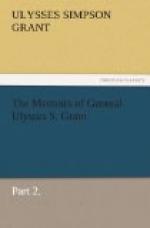The winter of 1860-1 will be remembered by middle-aged people of to-day as one of great excitement. South Carolina promptly seceded after the result of the Presidential election was known. Other Southern States proposed to follow. In some of them the Union sentiment was so strong that it had to be suppressed by force. Maryland, Delaware, Kentucky and Missouri, all Slave States, failed to pass ordinances of secession; but they were all represented in the so-called congress of the so-called Confederate States. The Governor and Lieutenant-Governor of Missouri, in 1861, Jackson and Reynolds, were both supporters of the rebellion and took refuge with the enemy. The governor soon died, and the lieutenant-governor assumed his office; issued proclamations as governor of the State; was recognized as such by the Confederate Government, and continued his pretensions until the collapse of the rebellion. The South claimed the sovereignty of States, but claimed the right to coerce into their confederation such States as they wanted, that is, all the States where slavery existed. They did not seem to think this course inconsistent. The fact is, the Southern slave-owners believed that, in some way, the ownership of slaves conferred a sort of patent of nobility—a right to govern independent of the interest or wishes of those who did not hold such property. They convinced themselves, first, of the divine origin of the institution and, next, that that particular institution was not safe in the hands of any body of legislators but themselves.
Meanwhile the Administration of President Buchanan looked helplessly on and proclaimed that the general government had no power to interfere; that the Nation had no power to save its own life. Mr. Buchanan had in his cabinet two members at least, who were as earnest—to use a mild term—in the cause of secession as Mr. Davis or any Southern statesman. One of them, Floyd, the Secretary of War, scattered the army so that much of it could be captured when hostilities should commence, and distributed the cannon and small arms from Northern arsenals throughout the South so as to be on hand when treason wanted them. The navy was scattered in like manner. The President did not prevent his cabinet preparing for war upon their government, either by destroying its resources or storing them in the South until a de facto government was established with Jefferson Davis as its President, and Montgomery, Alabama, as the Capital. The secessionists had then to leave the cabinet. In their own estimation they were aliens in the country which had given them birth. Loyal men were put into their places. Treason in the executive branch of the government was estopped. But the harm had already been done. The stable door was locked after the horse had been stolen.




